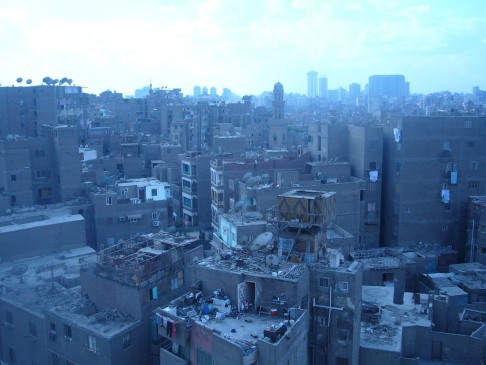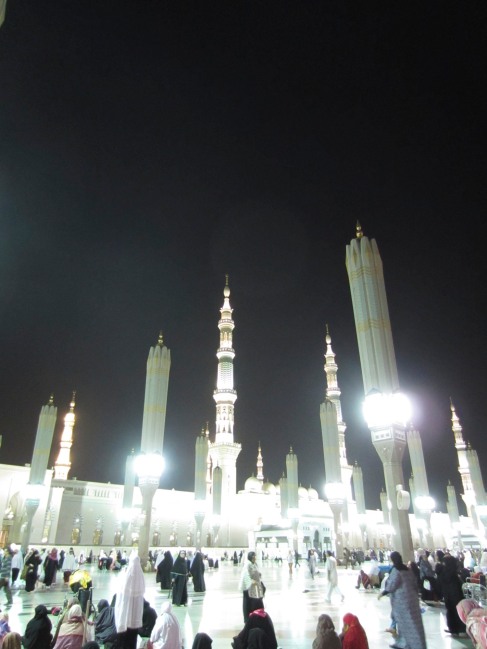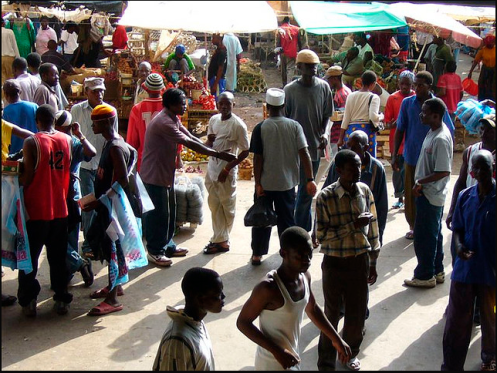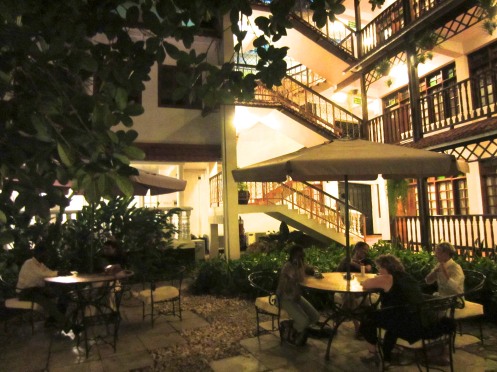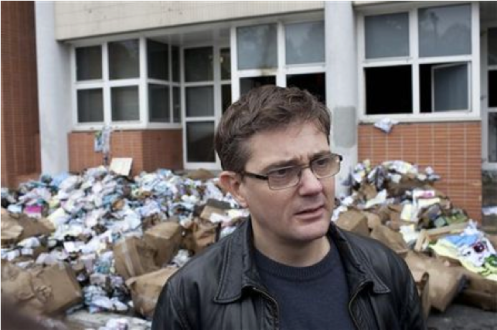…It’s like the idea of white privilege. As a white person you can’t fully realize the privilege you have because you have/will never experience living without it. Or rather, you can realize it and acknowledge it, but you will never fully understand it. It’s the same idea applied to someone of my socioeconomic background in Egypt. I can realize how blessed I am to have this privilege, and in fact many do because it is part of Islamic teachings. But in the end we can never fully understand it, even if we do experience living without it for a period of time. In fact, one of the main ideas behind Ramadan is to deny yourself some of the privileges you were blessed with and to experience the denial that many people live on a daily basis. But even that is nowhere near similar, not only because many people have forgotten this side of Ramadan and simply take it as a religious teaching (or cultural/ritualistic practice), but also because in the end this denial is by choice. A denial by choice can in no way compare to a forced denial. As I choose to deny myself for a temporary period of time, in the end I know where my next meal is coming from. Many people do not. And half of the battle of poverty is the insecurity that comes with it. In a sense, privilege is more than just the idea of having, it is about the security of knowing what you will have and the certainty that you will have it. The certainty that you will have this much money at the end of the month. The certainty that you will go home to find a warm meal on the table or at least food in the fridge. It’s true that being a Muslim entails a belief in the ultimate uncertainty of things. For example, as a Muslim I fundamentally belief that everything I hold dear to me can be taken away from me in a split second if Allah so chooses. I believe this, however, do I feel it? Is that really part of my emotional make-up? This belief impacts my psyche in that it makes me grateful for everything I have, and humble knowing that I have it through no effort or worth of my own. But I do not feel insecure. I do not feel afraid. These emotions are not part of my psyche. People of privilege (be that white, male, socioeconomic, or otherwise) can understand what privilege means in terms of the “things” they have, but privilege as security is something we can never truly comprehend until we lose it.
Fundamentalism Begets Fundamentalism
•October 27, 2012 • Leave a Comment[…] we are witnessing the many ways economic struggles over tight housing markets may spawn brutal inter-religious or interethnic conflict. We can understand these processes according to a post-9/11 vocabulary of terrorism — one that leaves us with the paralyzing discourse of civilizational conflict, religious essentialisms, and an “axis of evil”. Or, we can understand these processes in a historicized framework of urbanization and urbanism, whereby the fascism of contemporary religious fundamentalisms may be related to the fascism of neoliberal free markets and the new American imperialism. For the latter is a type of fundamentalism as well.
Nezar AlSayyad and Ananya Roy (2004) “Urban Informality: Crossing Borders” in “Transnational Perspectives from the Middle East, Latin America and South Asia” p.5.
Eid Mubarak: Yearning for Makka & Madina
•October 27, 2012 • Leave a CommentEid Mubarak everybody!
The sense of longing I have right now for Makka and Madina is so strong I feel like if I concentrate really hard I could teleport myself there through sheer will. I was blessed to go do a Umra last year and it was an experience I will never forget. Everyone told me how I would feel, but I honestly didn’t believe them. But when I went there, I felt something in my heart…deep down in my soul that I can’t put into words. Everyone also told me you will like Madina more than Makka because it’s more laid back, but I loved them both equally. It’s true that Madina was more laid back, and I truly enjoyed the process of waking up every day at dawn, looking out the hotel window and seeing hundreds of thousands of people coming from different directions all walking towards the Masjid, looking like ants from high up, and then going down to join them, all walking together in the dark. We used to pray in the open air area in front of the Masjid rather than inside because it was too crowded for my mother, but I love praying outdoors and sitting on the ground reading quran with the breeze and hearing the buzz around me of people making duaa or praying, and then hearing the azan and praying, it was just peaceful, more peace than I have ever experienced.
My parents and I had a routine: dawn prayer, breakfast at the hotel, sleep till noon, noon prayer, walk around Madina and have lunch, then go back to the Masjid to spend the several hours of Asr, Maghrib and Isha in the Masjid reading Quran and praying.
The trip from Madina to Makka was difficult (7 hours with only pit/squat toilets, and our bus broke down mid-way). But I did not mind it because I was fasting during that trip, so I was feeling very calm and tired so I slept pretty easily. We made it to Makka well after iftar time but we stopped at a market on the way and I bought some biscuits and juice for iftar.
There are two things I will always remember from that journey: the first is all of us doing Talbeya on the bus together as we entered Makka. Labbayka Allahumma Labbayk! I love saying those words: here we are oh Allah, at Your service, wanting nothing but Your mercy, You have no partner nor equal, and to You belongs all praise, blessings, and glory, for You have no partner. Every single person on that bus was chanting those words in unison as we entered Makka, just peacefully chanting as we stared out our windows trying to wrap our heads around the fact that we had finally made it. It was an amazing moment.
The second thing I won’t forget is how women were treated on that trip, especially older/elderly women. During the entire 11 day trip I have never seen women treated in a way that felt more Islamic. Whether it was in Madina, on the bus, or in Makka, the men who were in my group were like poster children for how a Muslim should truly treat older women, in full embodiment of the prophetic hadith that Janna lies under the feet of mothers. They carried their bags, helped them up and down stairs, did everything they could to make them comfortable. During the bus journey there was one guy we almost started to feel bad for because every time he sat down this elderly woman would ask him to move her heavy bags from one end of the bus to the other, but every time he got up and did it and did not complain or even frown, he would just smile and say hader ya ommy, at your beck and call mother. She was not his mother nor were they at all related. This scene was replicated throughout the trip. It was really beautiful to see that, and since we were all Egyptian it made me fall in love with my countrypeople all over again, and it gave me hope that maybe one day we can get over the immense religious illiteracy we have in our country that causes us to often do the exact opposite of what Islam commands us to do.
When we finally arrived in Makka we went straight to the Tawaf, which was incredibly difficult for me because I could see my mother was so exhausted she looked like was about to pass out at any second, and she kept getting pushed and losing her balance, so I spent most of the time trying to cover her from all sides so nobody could get near her. Eventually we got a wheelchair for her because she just couldn’t get through the last few rounds of Safa and Marwa. Makka was an amazing experience, praying every single day in front of the Kaabah was breathtaking, but I will never forget that one day when there was a thunderstorm around maghrib time, we stood there in silence as the imam made the iqama, and it was pouring rain, and there was thunder and lightning, and the imam started reciting Surat al Raad, and as he said those words “even the thunder speaks glorifies and praises Him” I think everyone was moved to tears. It was one of the most profound spiritual experiences I have ever had.
Yes, that huge shopping mall makes the trip as a whole more comfortable and a little less spiritual, and yes part of me wishes I could it like they did years ago when there was no fancy shopping mall, when the trip involved a degree of physical hardship and people slept in tents, I truly wish I could do it that way because I feel that would enhance the overall learning experience. But in the end, nothing can detract from the profound impact a trip like that has on your soul. I pray Allah grants me the blessing to do it again.
Taraweeh prayers in Sultan Hassan mosque (led by the wonderful Imam Ahmed Hemaya)
•March 10, 2012 • Leave a Comment
Today I suddenly felt a longing for Taraweeh prayers in Sultan Hassan (my favourite mosque). It was a feeling so strong it brought tears to my eyes, especially when I realized I won’t be in Egypt next Ramadan (I’ll be spending next Ramadan with my brother in Canada). The mere idea of spending all of Ramadan without being able to pray Tarweeh in Sultan Hassan is incredibly depressing 😦
Visiting Tanzania
•March 10, 2012 • 1 CommentI got to visit Tanzania a couple of weeks ago. It was part of a work trip so unfortunately I did not get the chance to get out of Dar Es Salaam, I barely even got the chance to get out of the hotel! But on the last day I managed to escape from the force of nature that is the Dutch woman who organized the seminar, and headed to the local Kariakoo market with a lovely South African woman. The market was incredibly crowded, loud, and full of different smells at every corner. In other words, I felt right at home! I bought plenty of tea, vanilla, and pretty kangas, and enjoyed attempting to haggle relying primarily on sign language. That short period of time spent at the market that reminded me so much of Cairo’s bustling markets was the highlight of the trip for me. It’s amazing how often we can’t help but gravitate towards what makes us feel home.
Another highlight of the trip was that I got to meet people from all around Africa! I met people from Ghana, Uganda, Kenya, Mozambique, and of course plenty of Tanzanians, in addition to one Indian and two Dutch people. I even got to meet an ex-guerilla fighter from Mozambique! It was truly a confluence of different cultures, which was amazing to experience, and I will never forget one of my all-time favourite conversations I had with an Indian and a Ugandan where somehow we ended up talking about everything from food to politics to philosophy and religion.
Since I did not really get a chance to see the real Tanzania, I definitely plan on visiting the country again, but this time I would like to visit Zanzibar and Arusha which I heard a lot about from both tourists and locals while I was in Dar. I would also really love to see more of “black” Africa. Many of the people I met there asked me if this was my first African country. I would tell them I’m Egyptian? They unanimously gave the same answer “No Egypt doesn’t count, we mean black Africa!” I couldn’t argue, Egyptians rarely perceive themselves as Africans unfortunately.
All in all, it was a great trip, but it’s great to be back home!
Returning
•February 24, 2012 • Leave a CommentI’m not sure why I took a break from the blog. I felt the need for a period of silence, but all I got was more noise.
Hopefully from now on this blog will be updated more or less regularly. And I’ll start by sharing one of my favourite songs from the revolution: Rageen (Returning) by Egyptian underground band Eskenderella
Northern Lights
•November 16, 2011 • 3 CommentsBreathtaking! What I’d give to go to Norway or Finland right now…Someday insha’Allah!
Charlie, are you kidding me?
•November 9, 2011 • 1 CommentBismiLlah al-Rahman al-Raheem,
It happened again. Charlie Hebdo, a french satirical magazine, did a special issue called “Charia Hebdo” claiming that a character supposedly our Prophet (pbuh) is its editor-in-chief. “100 lashes for those who don’t laugh” says a bearded man with a turban on the cover (guess who?).
To keep it short, and we mentioned it God knows how many times that this is typical. It’s like an old joke, a broken record. Get over it.
The problem is, once the issue came out, the next night, the Charlie Hebdo HQ were burnt down to the ground. (Note: they still don’t know who did it, but they assume it’s the Muslim extremists)
Unfortunately it is that kind of bad humour that gives the extremists an opportunity to cross the line. They’re just giving them a free pass for trouble.
And people like Professor Tariq Ramadan have to go on shows repeating millions of times that this is not what Islam stands for, and it goes against our Shariah (Charia if you’d like), etc. It’s like erasing all the interfaith dialogues and making the Islamic da’ias and scholars start from scratch. It’s growing enmity between religions, widening the gap between each other.
Thank you extremists. Thank you Charlie.
Someone tells me that only Muslims are not allowed to draw the Prophet (pbuh) but non-Muslims can, it’s freedom of expression!
No it’s not, it’s called insulting, it’s called you not getting that with your freedom comes the others’ as well. It’s called you being responsible enough to not reach others’ freedom of belief. It’s you being intolerant and narrow-minded.
Would you like me to stick your head on a donkey and publish it for the whole word to see? Haha you say?
Others will say: well, about Jesus (as)? You don’t say anything when he’s on the cover of a satirical magazine!
Well we should.
We should make it loud and clear that making fun about people is of bad taste. Drawing silly caricatures is like ghiba, backbiting. I’m sick and tired of people pointing fingers, making fun, childishly criticizing each other.
Basta.
Must read article: http://blogs.mediapart.fr/blog/halluka/071111/charlie-hebdo-bonbing-who-reaping-benefits
Matewan and Blair Mountain
•October 24, 2011 • Leave a CommentAs part of my increasing interest in labour rights – especially since the revolution and since there is now hope that we may one day actually have independent unions in Egypt – I stumbled upon this little bit of American history while reading about independent filmmaker John Sayles. This is the story of the Matewan Massacre from Wikipedia:
At the time, the United Mine Workers of America had just elected John L. Lewis as their president. During this period, miners worked long hours in unsafe and dismal working conditions, while being paid low wages. Adding to the dilemma was the use of company scrip by the Stone Mountain Coal Company, because the scrip could only be used for those goods the company sold through their company stores, thus the miners did not have actual money that could be used elsewhere. A few months before the battle at Matewan, union miners in other parts of the country went on strike, receiving a full 27 percent pay increase for their efforts. Lewis recognized that the area was ripe for change, and planned to organize the coal fields of southern Appalachia. The union sent its top organizers, including the famous Mary Harris “Mother” Jones.[1] Roughly 3000 men signed the union’s roster in the Spring of 1920. They signed their union cards at the community church, something that they knew could cost them their jobs, and in many cases their homes. The coal companies controlled many aspects of the miners’ lives.[2] Stone Mountain Coal Corporation fought back with mass firings, harassment, and evictions.[3]
A contingent of the Baldwin-Felts Detective Agency arrived on the no. 29 morning train in order to evict families that had been living at the Stone Mountain Coal Camp just on the outskirts of town. The detectives carried out several evictions before they ate dinner at the Urias Hotel and, upon finishing, they walked to the train depot to catch the five o’clock train back to Bluefield, West Virginia. This is when Matewan Chief of Police Sid Hatfield decided that enough was enough, and intervened on behalf of the evicted families. Hatfield, a native of the Tug River Valley, was an adamant supporter of the miners’ futile attempts to organize the UMWA in the saturated southern coalfields of West Virginia. While the detectives made their way to the train depot, they were intercepted by Hatfield, who claimed to have arrest warrants from the Mingo County sheriff. Detective Albert Felts and his brother Lee Felts then produced his own warrant for Sid Hatfield’s arrest. Upon inspection, Matewan mayor Cabell Testermanclaimed it was fraudulent. Unbeknownst to the detectives, they had been surrounded by armed miners, who watched intently from the windows, doorways, and roofs of the businesses that lined Mate Street. Stories vary as to who actually fired the first shot; only unconfirmed rumors exist. Thus, on the porch of the Chambers Hardware Store, began the clash that became known as the Matewan Massacre, or the Battle of Matewan. The ensuing gun battle left seven detectives and four townspeople dead, including the Felts brothers and Testerman. The battle was hailed by miners and working class members for the number of casualties inflicted on the Baldwin-Felts detectives. This tragedy, along with events such as the Ludlow Massacre in Colorado six years earlier, marked an important turning point in the battle for miners’ rights.
Governor John J. Cornwell ordered the state police force to take control of Matewan. Hatfield and his men cooperated, and stacked their arms inside the hardware store. The miners, encouraged by their success in getting the Baldwin-Felts detectives out of Matewan, improved their efforts to organize. On July 1 the miners’ union went on another strike, and widespread violence erupted. Railroad cars were blown up, and strikers were beaten and left to die by the side of the road. Tom Felts, the last remaining Felts brother, planned on avenging his brothers’ deaths by sending undercover operatives to collect evidence to convict Sid Hatfield and his men. When the charges against Hatfield, and 22 other people, for the murder of Albert Felts were dismissed, Baldwin-Felts detectives assassinated Hatfield and his deputy Ed Chambers on August 1, 1921, on the steps of the McDowell County Courthouse located in Welch, West Virginia.[5] Of those defendants whose charges were not dismissed, all were acquitted. Less than a month later, miners from the state gathered in Charleston. They were even more determined to organize the southern coal fields, and began the march to Logan County. Thousands of miners joined them along the way, culminating in what was to become known as the Battle of Blair Mountain.
The Battle of Blair Mountain was the first (and only?) time bombs were dropped on American citizens by the American army. The way things are going in Egypt these days, I sometimes get the sense we’re heading towards another revolution, one that will look a lot like Blair Mountain. It’s also very interesting to listen to Sayles describe the strategies relied on to ensure the workers would never unite (taken from his interview with Democracy Now:
Yeah, Matewan is a movie about a labor strike, a coal miner strike in 1920 in West Virginia. The way that the coal operators tried to keep workers divided in those days was what they called a judicious mixture, which would be to hire a third hillbilly miners from West Virginia, a third immigrants from Yugoslavia, Italy, wherever, and a third black miners from the South, where the mines were just tapping out, and they would come up and be — trying to use them as strikebreakers. Often housed them in three different places, put them into the mine from three different places so that they couldn’t even meet on the job. And they thought, “Well, these people will never get together and form a union.” But in fact, the conditions were so bad and the pay was so bad that they found ways to find each other and ended up forming — the UMW was one of the most integrated unions of that time.
You can watch Matewan, the film by Sayles about the Matewan Massacre, on YouTube:
Uninspired…and then inspired once again
•October 21, 2011 • 1 CommentI’m feeling very uninspired today. In fact, I’ve been feeling that way a lot lately. I feel like I have thinker’s block. In the same way someone who has writer’s block is unable to write, I feel I’ve lost the ability to think. I can sit for several minutes, concentrating, eyes shut, trying to focus, trying to formulate one coherent thought. Nothing. All I get is the buzz of Cairo traffic, talk shows, political debates, the never-ending report I have to finish for work, the image of Qadhafi dead, the mundane conversations I keep having over and over again about things there is no point conversing about, like “Do you think the Muslim Brotherhood will take over Egypt? Do you think Egyptians will ever be free?”. The questions that have no answer, and yet people insist on asking them. Buzz, just buzz, that’s all I get. I’m reminded of something Turkish writer Orhan Pamuk says in his book “Other Colours”:
“What’s troubling you”
“You already know. It’s these spring afternoons.”
“You’re depressed”
“It’s worse than depression. I want to disappear. I don’t care if I live or die. Or if the world comes to an end, even. In fact, if it ended right this minute, so much the better.
It’s not a dark and morbid depression, and it’s not melodramatic. It’s just…perspective. This life we’re living right now is just a tiny dot compared to the afterlife, and when I think of it that way, it puts me at ease, it reminds me that one day, all this will be over, no more poverty, no more injustice, no more Qadhafi or Mubarak or Saleh or Asad, and no more boring reports for work. All there will be is justice.
It’s just an acute sense of the Quranic aya “Surely, we have created man into toil and struggle”. In the Quran, the actual word used that has been translated into “toil and struggle” is “kabad”. The original meaning of “kabad” is the middle of the day, or the hottest part of the day, or to be walking in the middle of a sand dune such that taking one step forward is with great difficulty. You are born into the world crying, that is your destiny and you have no say in the matter. You cannot choose to come out of the womb with a smile on your face, that is how you are destined to come into the world, but how you leave this world is up to you. We will all struggle through life, whether you’re living in a slum and worried that the water your children are drinking might give them cholera, or whether you’re like me, just exhausted by the lack of ability to think (that really puts things into perspective doesn’t it). But in the end, we will both leave this world, and that poor slum-dweller may leave this earth with a peaceful smile on the lips and the words “la ilaha illa allah” on the tongue.
I hope when it’s my time, I don’t leave this earth still thinking about that never-ending report I have to finish for work.

